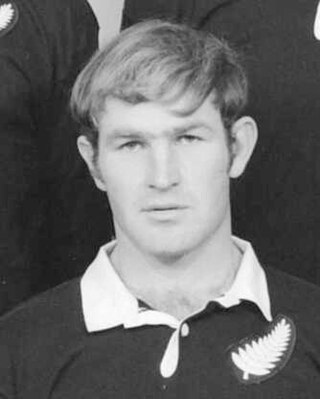
Sir Wilson James Whineray was a New Zealand business executive and rugby union player. He was the longest-serving captain of the national rugby union team, the All Blacks, until surpassed by Richie McCaw in 2014. Rugby writer Terry McLean considered him the All Blacks' greatest captain.

Sir John James Patrick Kirwan is a New Zealand mental health advocate, former rugby union and rugby league player, and former rugby union coach.

Sir Michael Niko Jones is a New Zealand former rugby union player and coach.

Sir Wayne Thomas "Buck" Shelford is a former New Zealand rugby union footballer and coach who represented and captained New Zealand in the late 1980s. He is also credited with revitalising the performance of the All Blacks' traditional "Ka Mate" haka.

Sir Graham William Henry is a New Zealand rugby union coach, and former head coach of the country's national team, the All Blacks. Nicknamed 'Ted', he led New Zealand to win the 2011 World Cup.

Sir Gordon Frederick Tietjens is head coach of the Samoa rugby sevens team, and a celebrated former coach of the New Zealand men's national team in rugby sevens, the All Blacks Sevens. When the International Rugby Board inducted him into the IRB Hall of Fame in May 2012, it said that "Tietjens' roll of honour is without peer in Sevens, and perhaps in the Game of Rugby as a whole." According to Spiro Zavos, Tietjens is "The greatest of all the Sevens coaches".
John Bernard Hart is a New Zealand former rugby union personality who coached and managed both the All Blacks and the Auckland rugby union team, and played rugby for Waitemata and Auckland.

Ian Andrew Kirkpatrick is a former New Zealand rugby union player. Described as "supremely athletic, fast, fearless and with an uncanny sense of anticipation", Kirkpatrick is widely regarded as one of the greatest flankers to have ever played the game. His try-scoring ability was astonishing; at the time Kirkpatrick played rugby, it was rare for forwards to score tries, but his 16 test tries were an All Black record until Stu Wilson surpassed it in 1983. He also captained the All Blacks and was inducted into the World Rugby Hall of Fame in 2014.

Sir David John Graham, generally known as John Graham, was a New Zealand educator and rugby union player. He served as president of the New Zealand Rugby Football Union (NZRFU) and was an All Black loose forward; he played 22 Tests between 1958 and 1964, including three as captain. He was headmaster of Auckland Grammar School from 1973 to 1993, New Zealand cricket team manager from 1997 to 1999, the University of Auckland Chancellor from 1999 to 2004, and was elected president of the NZRFU in April 2005.
Paul Lane Penn was a New Zealand rugby union player, coach and administrator. A wing, Penn played for Taranaki and Wairarapa at provincial level, and later became coach of Wairarapa-Bush. He was an All Black selector from 1988 to 1991, and served as president of the New Zealand Rugby Football Union from 2001 to 2003.
Alexander John "Grizz" Wyllie is a New Zealand rugby union former player and coach.

The Wairarapa-Bush Rugby Football Union is the body that regulates rugby union in Masterton, New Zealand. It was formed in 1971 with the amalgamation of the Wairapapa and Bush Unions.
The South Canterbury Rugby Football Union (SCRFU) is a rugby province based in the central South Island city of Timaru, New Zealand. The South Canterbury team play at Fraser Park located in Timaru.

Sir Frederick Richard Allen was a captain and coach of the All Blacks, New Zealand's national rugby union team. The All Blacks won all 14 of the test matches they played under his coaching.

Richard John Dunn was a New Zealand boxing coach.
Wairarapa College is a state coeducational secondary school located in Masterton, New Zealand. The college first opened in 1938, following the merger of Wairarapa High School with the Masterton Technical School. Serving Years 9 to 13, the college has 1,039 students as of February 2024, including approximately 175 resident in the school's on-site boarding hostel, College House.
The Lochore Cup is a New Zealand rugby union trophy named after famed Wairarapa Bush and All Blacks player and coach Brian Lochore. It is contested during the Heartland Championship. It was first awarded in 2006, when the Heartland Championship format was introduced.

Sir Ronald Powell Carter is a retired New Zealand businessman.
The 2007 Special Honours in New Zealand were two Special Honours Lists: the first was published on 6 February 2007, in which four appointments of additional members were made to the Order of New Zealand to celebrate the 20th anniversary of the establishment of the Order; and the second was dated 21 May 2007, and recognised the incumbent governor-general, Anand Satyanand. The appointments were made by Elizabeth II in her right as Queen of New Zealand, on the advice of the New Zealand government.
Captain Walter "Wattie" Pukauae Barclay,MM, QSM, was a New Zealand rugby union player, sports administrator and military officer. He captained the New Zealand Māori Rugby Team and holds the record for the highest number of tries scored for the team with 40 career tries.














